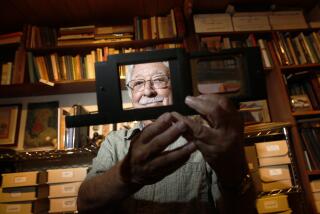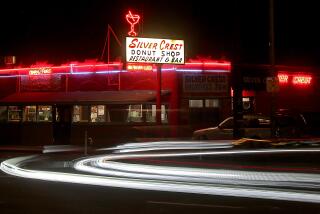Jane Way dies at 91; Sutter Creek Inn owner
Built in 1859, the simple cottage in the scenic Gold Rush town of Sutter Creek wasn’t even on the market in 1966 when Jane Way persuaded the owner to sell it.
Way bought it “on a whim,” she later said, during “an all-time low in my life.”
“My son had been killed in an accident, my husband had split, my health was terrible — I’d had cancer twice,” she told the San Francisco Chronicle in 1999.
Seeking to reinvent her life, Way turned the property into the Sutter Creek Inn, an early bed and breakfast in the West that served as a prototype for many that followed, according to travel guidebooks.
Way died April 30 after a brief illness at her home on the grounds of the inn, said her daughter, Lindsay Way. She was 91.
Her “boundless energy and flair” helped “start the phenomenon of country inns” in California in the 1960s, Julianne Belote wrote in the 1999 book “Recommended Country Inns: West Coast.”
Where millions in gold had once been mined, innkeeper Way “struck a path back into the 19th century,” Jerry Hulse, then The Times’ travel editor, wrote in 1982.
She transformed the two-story clapboard set back from the town’s main street, California 49, into an antique-filled local landmark that was a popular “escape into a less-hurried world,” Hulse wrote.
Although Way was “spiritually attuned, graceful and witty, she also could be frank and firm,” her family said.
She did palm readings and handwriting analysis for guests, but she also made decisions at odds with the notion of hospitality.
In advertising, Way discouraged “portly guests” because they broke her antique chairs, and she insisted that parents leave their offspring at home.
A small notice she placed in 1967 in the San Francisco Chronicle was called “the season’s most memorable” by the newspaper’s columnist, Herb Caen.
“Christmas Holiday— spend an old-fashioned Christmas at Sutter Creek Inn! No Children,” the ad said.
Later, Way admitted that her character could be “sticky,” but she was welcoming of guests that she said came with the house — the “ghosts” of earlier owners and others.
Soon after opening the inn, Way said, she saw an apparition in a doorway that she later identified as that of state Sen. Edward Voorhies, who had lived there with his family more than 100 years before, she often recounted.
“There was a tall man wearing old-fashioned clothes standing in the doorway,” she told the Chronicle in 1999. “I heard the words, ‘I will protect your inn.’ He smiled and then faded away.”
She had bought the house from the senator’s daughter, Gertrude, who later materialized “in front of several guests … curtsied politely and disappeared,” according to the 2002 book “Haunted Places.”
With earthly guests, Way could be exceedingly direct. She once told a guest who had nabbed the last five strips of bacon from a public platter: “You must be an only child.”
She was born Margaret Jane Frampton on June 25, 1919, in Healdsburg, Calif., one of four children of Earl Frampton, a fruit buyer, and his wife, Ruby, a nurse.
For two years, Way attended San Francisco State and met her future husband, Gordon Way, while working as a department-store greeter.
They married in 1940, moved to Burlingame in the Bay Area and had five children. A daughter, Mary, died at four months old, and a son, Peter, was killed at 20 in a car accident.
When “the city girl” drove into Sutter Creek, she “discovered an elusive peace,” Hulse wrote in The Times in 1982, and stayed to relish it.
Her daughter Lindsay has run the inn for a decade.
Way is also survived by two sons, David of Harper, Ore., and Stephen of San Carlos, Calif.; a sister, Doris Golden of Healdsburg; two grandchildren; and five great-grandchildren.
More to Read
Start your day right
Sign up for Essential California for the L.A. Times biggest news, features and recommendations in your inbox six days a week.
You may occasionally receive promotional content from the Los Angeles Times.







